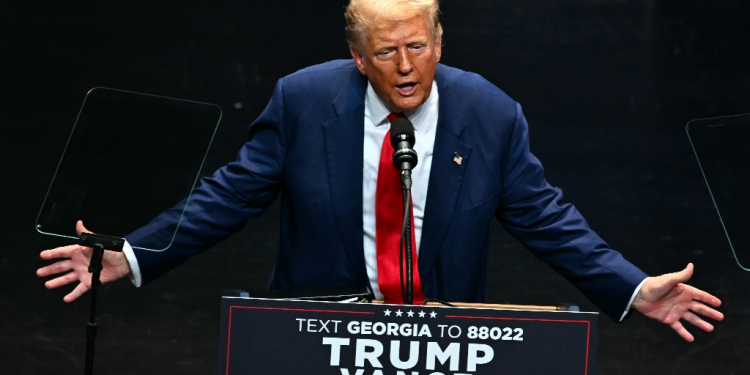(AFP) – Donald Trump pledged Tuesday to deliver a historic windfall for the United States through a business-friendly economy that would reward companies manufacturing domestically—but heavily penalize those selling Americans foreign-made goods. With the presidential election just six weeks away, the Republican candidate and his Democratic rival Kamala Harris are in a dead-heat race that influential pollsters have said is as close as any they have seen in years. They have been honing their economic messages as they target the few remaining undecided voters across a handful of battleground states, with Trump leaning heavily on a protectionist message as the key to unlocking US manufacturing potential.
In a speech in the hotly-contested state of Georgia, Trump repeated his plan to levy across-the-board tariffs on all foreign imports. “If you don’t make your product here, then you will have to pay a tariff, a very substantial tariff, when you send your product into the United States,” he told the Johnny Mercer Theatre in Savannah. He has previously described potential levies of 10 or 20 percent on all imports, and 60 percent or higher for Asian economic powerhouse China. It is Americans who pay the tariffs on US imports—not the foreign exporter—and economists estimate that the various versions of Trump’s plan would cost US households between $2,000 and $6,000 extra a year.
But Trump vowed to “take in” hundreds of billions of dollars to benefit American citizens and rejected the expert consensus that long-term tariffs cause inflation. He warned of his intention to levy a 100 percent tariff on cars imported from Mexico and said he would reduce corporate tax rates from 21 percent to 15 for companies manufacturing domestically. “With the vision I’m outlining today, not only will we stop our businesses from leaving for foreign lands, but, under my leadership, we are going to take other countries’ jobs,” Trump said, adding that “we’re going to take their factories.”
Trump, 78, also said he wanted German automakers to “become American car companies.” “I want them to build their plants here,” he said. “I want to beat China in electronics production.” Trump raised eyebrows Monday when he threatened US agricultural company John Deere with 200 percent tariffs if they move manufacturing to Mexico. Business tycoon Mark Cuban, a star of the ABC reality television series “Shark Tank,” said Trump’s across-the-board tariff plan was an example of his penchant for crafting policies “off the top of his head that tend to often be ridiculous, if not insane.”
“We all know that that’s inflationary, but he seems to think that that’s a tax on a foreign nation,” Cuban said of the proposals during a Harris campaign press call. “So what Donald Trump has suggested to John Deere in the 200 percent tariff is ridiculously bad and destructive,” he added. Trump also hit on previously released policies to reduce regulation and slash energy costs in half, and talked about selling off federal land and boosting port infrastructure as part of a blueprint he called the “New American Industrialism.”
He slammed Harris, 59, over her plan to repeal the tax cuts he signed into law at the end of 2017, which are due to expire at the end of next year, and accused her of raising energy prices and presiding over runaway inflation and spending. Harris, who was in Savannah last month, was off the trail on Tuesday in Washington. Ahead of Trump’s speech, the Teamsters unions in Georgia, Florida, and Alabama endorsed the vice president, meaning she now has the backing of branches representing more than 1.5 million active and retired members across the battleground states—although not the national organization. She was also endorsed in an open letter by more than 400 economic and business experts, including Nobel Prize winners, a former Federal Reserve vice chairman, and numerous university academics.
– Chandan Khanna with Frankie Taggart in Washington
© 2024 AFP










